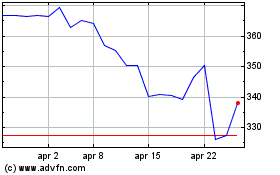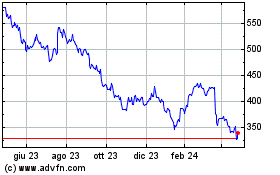Celebrity Route Pays Off for Puma -- WSJ
13 Gennaio 2018 - 9:02AM
Dow Jones News
By Sara Germano
This article is being republished as part of our daily
reproduction of WSJ.com articles that also appeared in the U.S.
print edition of The Wall Street Journal (January 13, 2018).
To market women's sportswear, industry executives have long
grappled with a perennial debate: Are celebrities or sports stars
more effective endorsers?
In the case of German brand Puma SE, its 2014 decision to sign
pop star Rihanna as a creative director appears to have paid off.
Annual sales have grown from EUR3 billion ($3.6 billion) to nearly
EUR4 billion, the brand has expanded distribution in major
retailers like Foot Locker Inc., and parent company Kering SA on
Thursday announced a plan to distribute 70% of Puma's shares to
Kering shareholders, praising the business's recent turnaround.
In Puma's most recent annual report, the company credited
Rihanna and "the fantastic development of our women's category" as
contributing to a 7% sales jump in 2016.
Puma Chief Executive Bjorn Gulden said fundamental differences
between how men and women buy sportswear led to the company's
decision to enlist Rihanna, a move that at the time was criticized
by industry analysts as a marketing ploy.
"It's unfortunately very difficult to find a female athlete that
means something in China, in Norway, in the U.S., and in Germany.
If you do, it's coming from someone in entertainment," the Norway
native said. "On the men's side, it's very different. You can
probably name 10 basketball players who mean something all over the
world, same with soccer."
Puma also outfits a range of prominent athletes, including
members of English soccer club Arsenal and Olympic champion
sprinter Usain Bolt, as well as some female athletes, like U.S.
sprinter Jenna Prandini. But it has expanded its roster of female
celebrities since Rihanna to include reality-television star Kylie
Jenner and singer Selena Gomez.
The celebrity marketing playbook hasn't always been effective
for sports brands. In the early 2000s, Reebok signed rappers Jay-Z
and 50 Cent to help expand its appeal at a time when it was known
for outfitting the National Football League and a shoe contract
with basketball star Allen Iverson. Reebok was acquired by rival
Adidas AG in 2006 and struggled to define its identity, eventually
abandoned its team-sports focus.
Yoga gear maker Lululemon Athletica Inc. ushered in the
"athleisure" era over the past decade with its high-price leggings
and strappy bras, all without splashy celebrity marketing. In a
2016 interview, Chief Executive Laurent Potdevin said the company
takes a decidedly different approach to marketing, using
affiliations with community fitness instructors.
"Those are the local superheros that you know in your
communities and you go to their studios," he said. "So we don't do
endorsements the way big athletic brands do."
To be sure, industry titans Nike Inc. and Adidas have done their
share of celebrity marketing, including partnerships with rappers
Kendrick Lamar and Kanye West, respectively. But they have
traditionally focused their marketing dollars on prominent
athletes, including women like sprinter Allyson Felix and tennis
player Caroline Wozniacki. Puma endorsed tennis star Serena
Williams early in her career, but Nike picked up her contract in
2003.
The big brands still have room to grow their women's businesses,
and have faced competition from upstarts. Nike said it would expand
a line of Jordan footwear for women this spring and partner with
online apparel seller Stitch Fix to better reach female consumers.
Meanwhile, Under Armour Inc. lost the head of its women's business
last fall, and said it would focus on performance gear as it
combats a streak of slowing sales.
Each of the major international sports brands -- Nike, Adidas,
Under Armour, Puma, and Lululemon -- were founded by and are helmed
by men.
Mr. Gulden, who has been Puma's CEO since 2013, said women take
their style cues from a range of sources, not just athletes. "Let's
face it, you women like to look good when you do sports," he said,
"and actually spend more money on the clothes than men do."
Industry tracker NPD Group said women accounted for 62% of
retail athletic-apparel sales in the U.S., for the year ended in
November.
(END) Dow Jones Newswires
January 13, 2018 02:47 ET (07:47 GMT)
Copyright (c) 2018 Dow Jones & Company, Inc.
Grafico Azioni Kering (EU:KER)
Storico
Da Mar 2024 a Apr 2024

Grafico Azioni Kering (EU:KER)
Storico
Da Apr 2023 a Apr 2024
